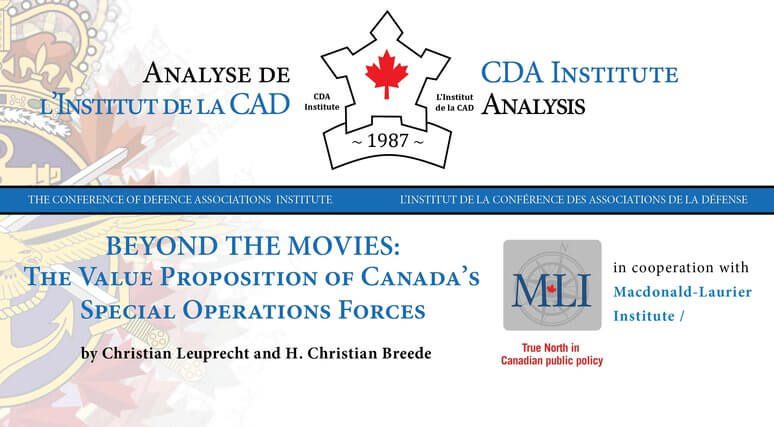The CDA Institute and MLI have partnered to issue a new study assessing the current role and possible future direction of Canada’s special operations forces
OTTAWA, Dec. 13, 2016 – What does the future hold for Canada’s special operations forces?
A new paper, jointly released by the Conference of Defence Associations Institute and Macdonald-Laurier Institute, offers a path forward.
The Government of Canada is currently undergoing a Defence Policy Review, which is expected to be completed by early 2017. And there are some expectations that special operations forces (SOF) – given their low visibility, small footprint, and high impact – will play a growing role in Canadian security and defence policy. But how to do that and keep our special forces special?
The paper, written by Dr. Christian Leuprecht, a professor at the Royal Military College of Canada (RMCC), a Munk Senior Fellow at MLI and professor in the Department of Political Studies at Queen’s University, and Dr. H. Christian Breede, CD, an Assistant Professor at RMCC, attempts to answer that question.
It offer three key recommendations: improve understanding of SOF; refrain from expanding SOF per se; and accelerate decision-making to optimize the effect SOF.
“Canada currently lacks the policies, national security culture, mechanisms, processes, and methods to optimize the use of SOF. As a result, Canada’s SOF is undersubscribed and under-utilized,” say the authors.
Most Canadians will be familiar with exciting Hollywood depictions of the US Delta Force or SEAL Team 6, or tantalizing news reports of our own JTF 2. But there are many misconceptions about special forces as well. This paper explores the capabilities of these forces, and how they can be best deployed to meet modern security threats.
As the authors explain, special forces can often be “the proverbial ‘easy button’ for government: limited engagement with precision at lower risk and cost; but SOF is a finite resource.”
To get the most out of Canada’s special forces, policy-makers require a better understanding of what SOF is and what it can do; they should be cautious about expanding SOF per se and focus instead on emerging capabilities in support of SOF such as air transport, fire support and cooperation with conventional forces; and they need better and quicker decision-making for deploying SOF so that it can be used to the full extent of its capabilities.”
To read the full paper, titled “BEYOND THE MOVIES: The Value Proposition of Canada’s Special Operations Forces”, click here.
***
The CDA Institute was created in 1987, with charitable status, to provide research support to the CDA and to promote informed public debate on security and defence issues and the vital role played by the Canadian Armed Forces.
Independent and non-partisan, the Macdonald-Laurier Institute fills a gap in Canada’s democratic infrastructure by focusing our work on the full range of issues that fall under Ottawa’s jurisdiction.
Dr. Christian Leuprecht is a professor at the Royal Military College of Canada (RMCC), a Munk Senior Fellow at MLI and professor in the Department of Political Studies at Queen’s University.
Dr. H. Christian Breede, CD, is an Assistant Professor at RMCC.
Media inquiries
Please contact the authors directly by email: christian.leuprecht@queensu.ca and Hans.Christian.Breede@rmc.ca. For further information, please contact Cybele Wilson at 613-236-9903 or email cybele.wilson@cdainstitute.ca. Or contact Mark Brownlee at the Macdonald-Laurier Institute at mark.brownlee@macdonaldlaurier.ca or phone 613-482-8327 x 105.





